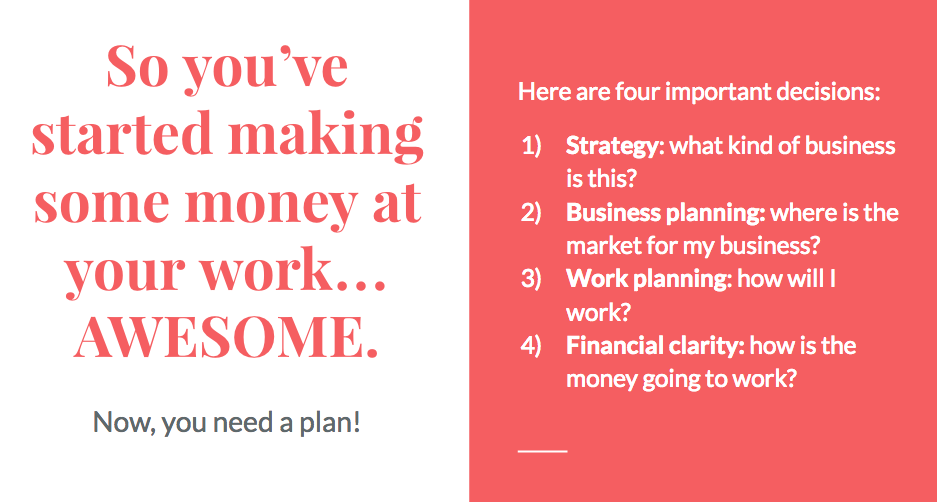You’re running (or starting!) your own business? LOVE IT.
Before you get into the money, you’ll want to know how your project is going to work for you — so you’re being strategic with your impact and time. Have fun!

Here are four important decisions to consider:
- Strategy: what kind of business is this?
- Business planning: where is the market for my business?
- Work planning: how will I work?
- Financial clarity: how is the money going to work?
Strategy: What kind of business am I?
A Sole Proprietor is the formal term for what most freelancers who work alone and declare income on their own taxes are doing. Whether you are a dogwalker, nanny, graphic designer, consultant, trainer, stripper….To the IRS, you are a Sole Proprietor of a business.
A Registered Partnership is a model similar to sole proprietor, with few restrictions though you’ll file separate taxes for it.
An LLC has one or more people involved, separates the business from the people involved, and is a “pass-through” for income and expenses – it has its own taxes if you’re involving multiple people but not if you’re only one member (owner).
An S- or C-corporation can be one or more people, can be used as a pass-through or an employer for income, has regulations about decisions, and separate taxes as well.
Business Planning: Who and where?
Who is the market for my business?
Where is the market for my business?
- If you can, identify a few people who are your ideal clients (or “market segment”).
- Where do they find you?
- How much do they pay you and how regularly?
- How do you let them know about your work, offerings, or otherwise connect with them?
Work Planning: When and how?
When will I work? Will I work 40 hours a week? More/less? When?
- Pro tip: 80/20 rule. Spend 80% of your time on the top-performing 20% of activities.
- Having start/stop times will let you hit small milestones.
- When you’re working, what are your most productive times?
How will I work? What helps you decide what to focus time on in the hours you dedicate to this work?
- Clarity on what you plan to do when can help make your time doing it more focused and productive.
- What is most joyful? What is most sustainably profitable?
Financial Clarity: How will the money work?
Once the money comes in – then what?
Quit your dayjob and take everyone you know out to lunch?
Probably not right away (and maybe not ever)
What do I want to achieve financially with this business? Examples:
- Pay off debt and save a bit
- Work at this full time and be my own boss!
- Build it over a few years and see what I can do with it
- Supplement other work and sock away retirement…
What if you want to do more to make the money simple?
If you’re ready to get super clear on what your business is going to do financially – and how to manage it simply, check out this course on Freelancer Finances.